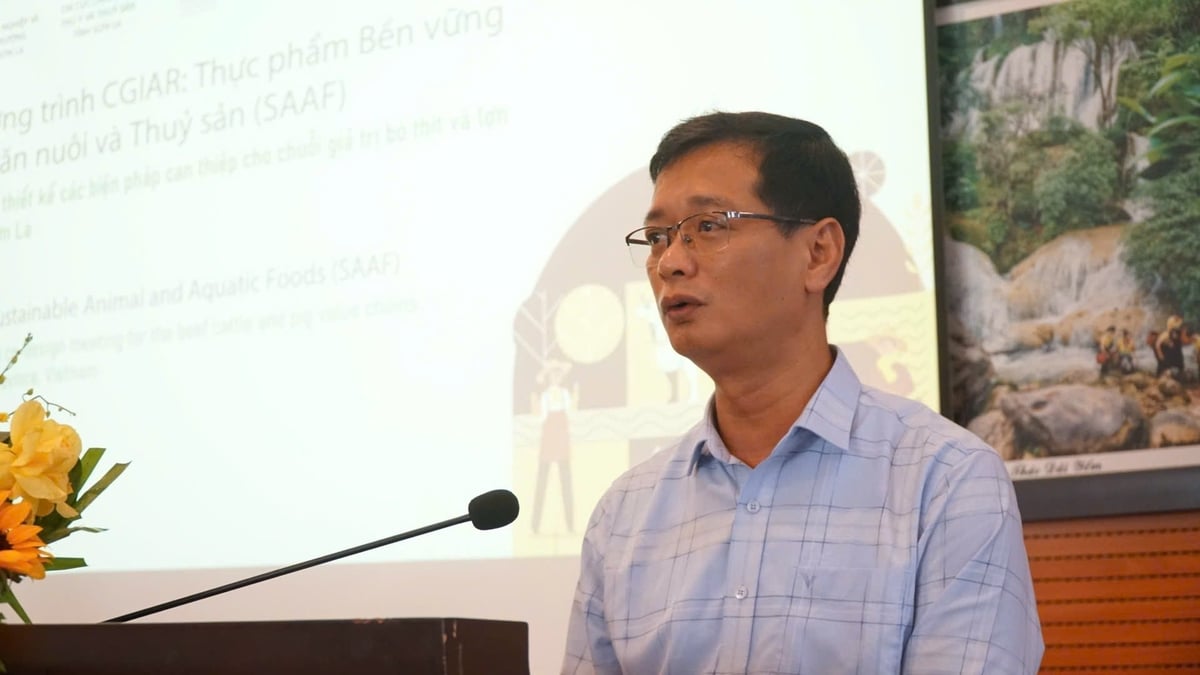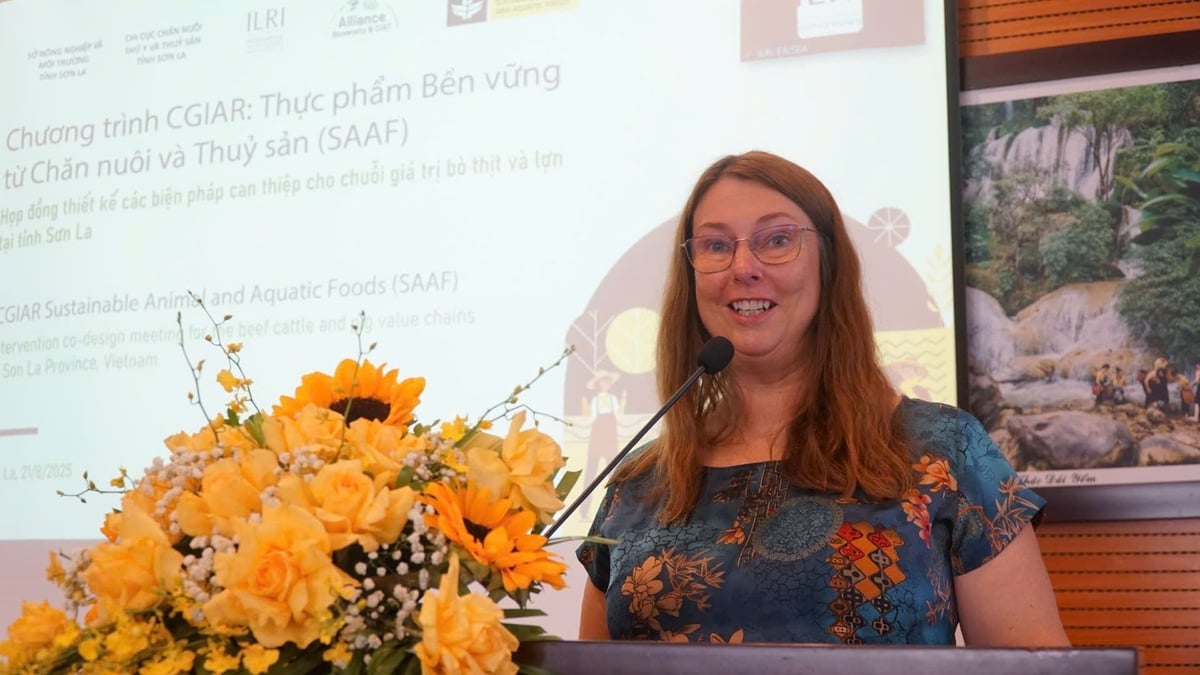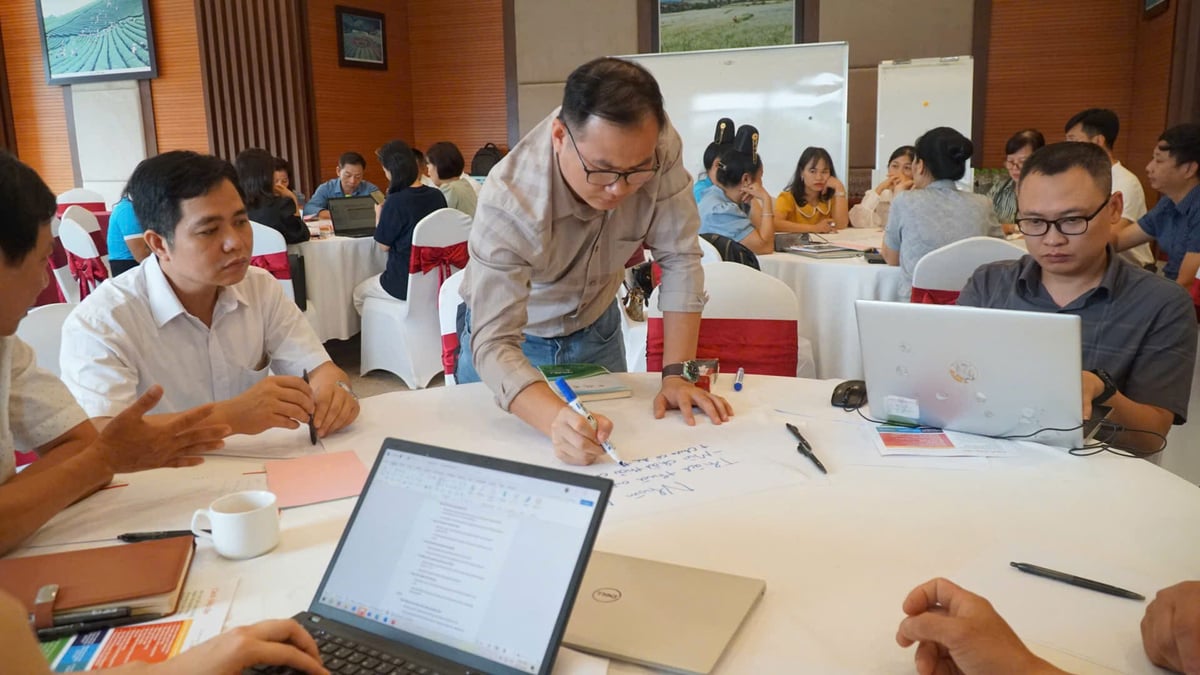December 1, 2025 | 08:59 GMT +7
December 1, 2025 | 08:59 GMT +7
Hotline: 0913.378.918
December 1, 2025 | 08:59 GMT +7
Hotline: 0913.378.918
On August 21 in Son La province, the International Livestock Research Institute (ILRI) and the Alliance Bioversity International - CIAT, in collaboration with the Son La Sub-Department of Livestock, Animal Health and Fisheries, organized a co-design workshop with stakeholders for the CGIAR Science Program on Sustainable Animal and Aquatic Foods (SAAF).
The workshop brought together researchers, government agencies, cooperatives, livestock service and input providers, as well as representatives of livestock farmers, to discuss new development directions for the livestock sector in the context of climate change and increasingly demanding market requirements.
Son La is one of the provinces with great potential for livestock development in the northern mountainous region. With vast terrain, abundant natural grasslands, and a cool climate, the province is well-suited for raising large livestock such as dairy cattle, beef cattle, buffalo, pigs, as well as native poultry. Through the SAAF program, scientists aim to work with local authorities to build a sustainable livestock system, focusing on beef and pig production - both to meet the nutritional needs of local communities and to produce high-quality, market-competitive products.

Mr. Tran Dung Tien, Deputy Director of the Son La Department of Agriculture and Environment, highly appreciated the outcomes brought by the SAPLING project. Photo: Duc Binh.
Speaking at the workshop, Mr. Tran Dung Tien, Deputy Director of the Son La Department of Agriculture and Environment, noted that the province currently has more than 107,000 buffaloes, nearly 390,000 cattle (including over 27,700 dairy cows), about 700,000 pigs, and over 8 million poultry. In recent years, livestock and poultry farming has become an important direction, creating jobs and stable incomes for tens of thousands of households. Advances in breeding, animal care, and husbandry techniques have been applied, improving productivity and the quality of herds. Several livestock products from Son La have already established strong brands in the market, particularly Moc Chau milk, as well as beef, pork, and native chicken.
However, Mr. Tien also candidly pointed out many challenges. As a mountainous province, Son La has a vast and complex terrain, with difficult transportation conditions. Harsh weather, with long cold winters and scorching hot summers, significantly affects livestock productivity. Free-range grazing remains common, while large-scale, concentrated farming models are still limited. Production is mostly small-scale, fragmented, and scattered, resulting in uneven product quality.
In addition, farmers’ access to science and technology varies greatly across regions. In many areas, people are not yet familiar with modern management practices, remain dependent on government support, and show limited initiative in engaging with enterprises and cooperatives.

Ms. Karen Marshall expressed her delight at continuing to implement the project in Son La. Photo: Duc Binh.
Ms. Karen Marshall, Deputy Director of the global SAAF program (CGIAR), stated: “We are currently developing the next phase of the Chan-henh project (2022–2025). Vietnam is one of the 17 focus countries of the project. This next phase will continue to scale up the interventions of the SAPLING project to help ensure food and nutrition security.”
The main objective of the workshop was to share lessons learned from the SAPLING program while laying the groundwork for a common vision, identifying expected outcomes, and exploring innovative approaches for the SAAF project. A key emphasis throughout was that the needs and priorities of farming households must always be placed at the center. Through this approach, the workshop developed a “Theory of Change,” outlining the necessary shifts in farmers’ awareness, behaviors, and production practices.

Experts discussed the objectives and implementation plans of the SAAF project. Photo: Duc Binh.
By listening directly to the voices of communes and farming households, the project team gained insights into their expectations for support, which range from access to quality breeding stock and animal care techniques to disease management and stable market outlets for their products.
SAAF experts emphasized that changing livestock practices requires a comprehensive set of solutions. First and foremost, it is important to raise awareness among both women and men farmers about the benefits of safe and sustainable livestock production. At the same time, it is essential to enable them to access credit, technology, and markets.
ILRI’s experience shows that when livestock farmers clearly see the economic benefits linked to environmental benefits, they are more willing to actively engage in the transition process.
Translated by Phuong Linh

(VAN) An increasing number of livestock farms are using biogas generators to create a source of renewable electricity, helping to save costs and mitigate environmental pollution.

(VAN) Small changes in rice cultivation, from irrigation methods and straw collection to input management, are paving a new way for Vietnam's agriculture in the journey toward emission reduction.

(VAN) With the project of converting biogas into renewable electricity, Australia is both helping pig farms reduce their energy costs by up to 25% and contributing to environmental protection.
![Hue aims for Net Zero: [1] Initial steps from green transportation](https://t.ex-cdn.com/nongnghiepmoitruong.vn/608w/files/huytd/2025/11/28/0853-anh-6-giao-thong-xanh-hue-094717_940-153724.jpg)
(VAN) For sustainable development, Hue City is implementing many solutions to promote green transportation, which is an important initial step on the journey to building a Net Zero Hue.

(VAN) Nghe An Province, one of the localities with the largest forest area in Vietnam, is set to gain significant benefits from the implementation of forest carbon credit payments.

(VAN) Circular agriculture helps Mekong Delta farmers cut greenhouse gas emissions while boosting incomes through efficient reuse of agricultural by-products.

(VAN) According to Mr. Vo Minh Thanh, Director of the Tay Ninh Department of Agriculture and Environment, Resolution 57 has created a new development pathway for the locality, shifting from traditional toward modern agriculture.